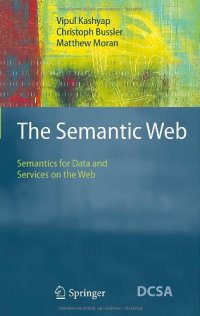
Ebook: The Semantic Web: Semantics for Data and Services on the Web
- Genre: Computers // Networking: Internet
- Tags: Information Systems Applications (incl.Internet), Artificial Intelligence (incl. Robotics), Computational Biology/Bioinformatics, Information Storage and Retrieval
- Series: Data-Centric Systems and Applications
- Year: 2008
- Publisher: Springer-Verlag Berlin Heidelberg
- Edition: 1
- Language: English
- pdf
The Semantic Web is a vision – the idea of having data on the Web defined and linked in such a way that it can be used by machines not just for display purposes but for automation, integration and reuse of data across various applications. Technically, however, there is a widespread misconception that the Semantic Web is primarily a rehash of existing AI and database work focused on encoding knowledge representation formalisms in markup languages such as RDF(S), DAML+OIL or OWL.
Kashyap, Bussler, and Moran seek to dispel this notion by presenting the broad dimensions of this emerging Semantic Web and the multi-disciplinary technological underpinnings like machine learning, information retrieval, service-oriented architectures, and grid computing, thus combining the informational and computational aspects needed to realize the full potential of the Semantic Web vision. Throughout the book, the use-case of a clinical vignette will serve to motivate and explain solutions based on Semantic Web technologies, emphasizing the application aspects related to data integration, knowledge acquisition, change management, semantic web services, and workflow management.
With this textbook, the authors deliver an application-driven state-of-the-art presentation of Semantic Web technologies, ideally suited for academic courses on the Semantic Web and architectures of information systems, and for self-studying professionals engaged in the design and implementation of advanced application systems.
The Semantic Web is a vision – the idea of having data on the Web defined and linked in such a way that it can be used by machines not just for display purposes but for automation, integration and reuse of data across various applications. However, there is a widespread misconception that the Semantic Web is a rehash of existing AI and database work. Kashyap, Bussler, and Moran dispel this notion by presenting the multi-disciplinary technological underpinnings such as machine learning, information retrieval, service-oriented architectures, and grid computing. Thus they combine the informational and computational aspects needed to realize the full potential of the Semantic Web vision.